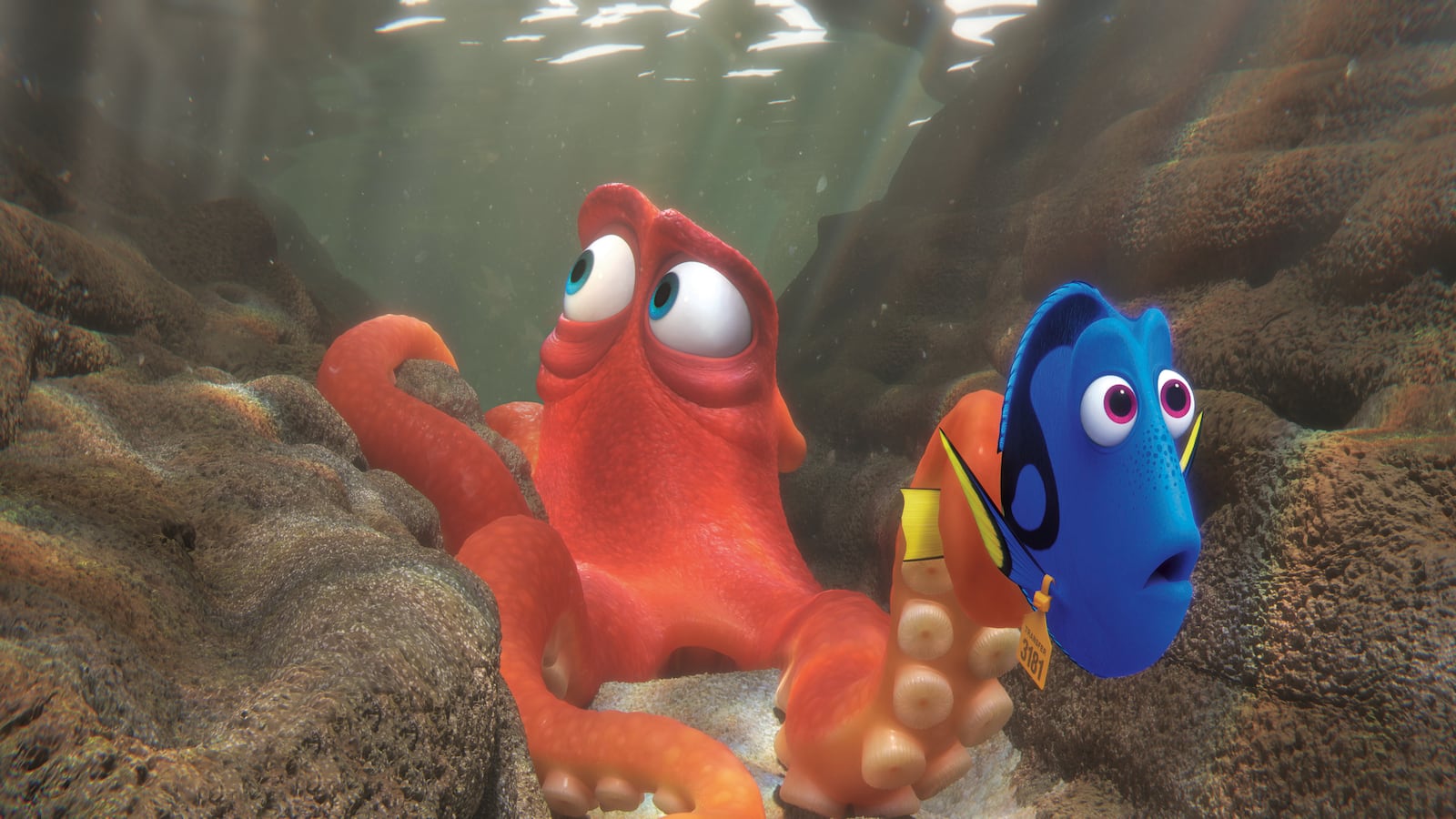I’m so desperate for my kids to see straightforward portrayals of disability onscreen that Friday night I broke my longstanding parental vow never to see a Pixar movie on opening weekend. I took my three sons to Finding Dory.
So many reviews had touted the film’s handling of cognitive and physical disabilities—disabilities were a presence in Finding Nemo, but are clearly The Message in its sequel—that I was both eager for my kids to see it and apprehensive lest the filmmakers screw it up.
My middle son, Edmund, has cognitive and physical disabilities. He is nonverbal and uses a wheelchair. Of course, it would be a grim world of children’s entertainment if all kid’s movies were solely feel-good teaching tools about life lessons. But representation matters. Edmund should see himself, and his brothers should also see him.
Look at this video of a girl with a prosthetic leg opening a present to discover her new American Girl doll also has a prosthetic leg. Her unchecked glee is an eloquent expression of the importance of disability representation. Yet there simply aren’t very many kids’ movies with disabled characters, and fewer still in which the disability plays a significant role.
Finding Dory is hardly the worst portrayal of disability, even out in theaters right now (I’m looking at you, Me Before You). But sadly, it may have been a significantly better representation of me—that is, a parent of a kid with disabilities—than of a character with disabilities. And it’s the representation of disabled people that’s terribly lacking, not representation of their parents.
Finding Dory does avoid some pitfalls of other disability-focused movies, notably a miraculous cure (nor does it even suggest the desirability of a cure) or what many disability activists call “inspiration porn.”

Inspiration porn is the tear-jerking portrayal of disabled people that, as comedian/disability activist Stella Young put it in her Ted talk on the topic, involves “objectifying disabled people for the benefit of nondisabled people. The purpose of these images is to inspire you, to motivate you, so that we can look at them and think, ‘Well, however bad my life is, it could be worse. I could be that person.’”
What Finding Dory gets right involves mostly Dory herself, played by Ellen DeGeneres. Dory has short-term memory problems (she says she “suffers from” them, cringeworthy lingo people ought not use for disability anymore, but it’s plausible that the character wouldn’t be up to speed—she’s a blue tang living near a coral reef, after all).
Dory has had no memory of where she came from or who her parents are. Suddenly, she is struck by a memory of her parents, and the rest of the movie involves her search for them.
What makes this an unusual portrayal of cognitive disability is that her sudden memory does not result from being, say, banged on the head or abruptly cured. Rather, it is the result of the fact that careful, painstaking lessons her parents had given her in how to return home had paid off. Throughout the movie, we see the benefits of those lessons. Much more importantly, we see how Dory has taught herself to get around in the world with her disability, such as how to make friends with some and avoid others who lack good will, how to ask for help when she needs it, how to solve problems.
Early tender scenes with Dory’s parents loving her and worrying about her future after they’re gone will of course hit home with any parent of a cognitively disabled child.
Initially Marlin (Nemo’s father, voiced by Albert Brooks), tries to exclude Dory from accompanying children on a school trip. No one is available to watch her, and he’s worried she will be a distraction and a drain on the teacher’s limited resources. He also loses his temper with her when her distractibility leads to a small injury to Nemo.
Marlin eventually learns, though, that while Dory’s disability means she sometimes requires assistance, she also has strengths that he lacks. Her disability doesn’t entirely give her her courage and creativity, but definitely contributes to it.
The most important and striking point that Finding Dory makes is the value of Dory’s independence, even though she has a cognitive disability. She teaches those around her that, yes, she may have cognitive difficulties, but the education she received—and has built on significantly through self-education—has prepared her to lead a life where she can both join the community as an asset, not a liability, and lead an independent life.
A truly unusual message for a movie about cognitive disabilities, but it’s notably a message primarily for non-disabled adults. It’s for parents afraid to let their cognitively disabled children be independent from them, and for adults who worry that including cognitively disabled people will be too much for a community to handle.
A bigger problem lies in the minor characters, many of whom also have disabilities.
Nemo’s underdeveloped fin is not made much of in this film, but there is a sweet vision-impaired shark who bumps into the walls of the tank. However, her wall-bumping is played entirely for laughs. A whale thinks he is unable to echolocate until he really believes in himself, and then he overcomes his disability (basically, the plotline of every awful inspiration porn film ever.)
The most glaring and frankly offensive character, though, is Gerald the sea lion. He has synophrys (a “unibrow”), an overbite, and somewhat misaligned eyes. He carries everywhere with him a child’s pail, and clearly reads as having an intellectual disability.
Gerald keeps trying to join the rock where a couple of non-disabled sea lions lay baking in the sun, and there’s enough room for him. But they bully and chase him off. Later, when Marlin and Nemo need Gerald’s pail to travel overland carried by a bird, no one asks Gerald for it. Rather, the non-disabled sea lions bully him and steal the pail.
And this is...apparently okay in the movie? It helps Marlin and Nemo get where they are going. They don’t chide the bullying sea lions.
Gerald never gets his pail back, although he does eventually climb on the rock. Not because the other sea lions invited him. Or realized he was great company. Or came to believe that he deserved a turn on the rock. Rather, because they decided to leave. He cheers himself in a mortifyingly stereotypical way, and the audience cracked up—more at him than with him.
I asked Edmund what he thought of the movie, and he gave me lots of smiles and “okay” and “yes” signs. Finding Nemo is his favorite movie, he adores aquariums, and he seemed about as delighted as I expected him to be. I’m not sure if he recognized himself in any of the characters, although it wouldn’t surprise me at all if he felt an affinity with Dory.
Asking my other kids what they thought of the film, though, made me wonder if the movie’s message of acceptance was a little too abstract and blunted for non-disabled kids to draw a lesson about how to deal with disabled people in real life.
My 8-year-old, Charlie, left the film declaring his affection for the sarcastic, slightly misanthropic octopus voiced by Ed O’Neill. I asked him what he thought of the disabled characters. He huffed, rolled his eyes ever-so-slightly, and said in a lilting adult-pleasing voice, “It was wonderful to see disabled people like Edmund on screen.” (Holy crap, sometimes your kids do have you pegged.)
I told Charlie to stop telling me what he thought I wanted to hear, and tell me what he really felt. Charlie said, “They didn’t really seem disabled to me. Or not similar enough to Edmund to matter. Maybe if they had a fish in a wheelchair.”
I asked my 4-year-old what he thought of disability in the movie, and he said Dory wasn’t disabled. Charlie naturally jumped in here with, “Of course she was, don’t you know anything?!” My 4-year-old responded, “The only disabled one was Gerald!”
As kids were filing out of the movie theater, however, many of them took a moment to notice and smile at Edmund. Usually, the majority of kids either stare or take care to avoid him. Was this a coincidence? Wishful thinking? Were they just coming down from a sugar crash? Hard to tell, but it gave me a bit of hope.




